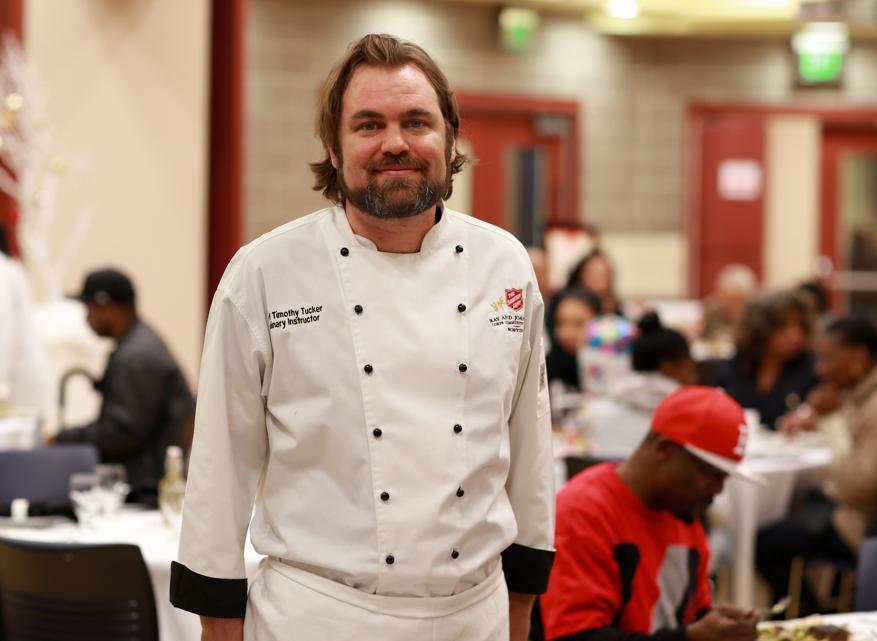
A dozen culinary arts student graduates celebrated at the Salvation Army’s Kroc Corps Community Center in Dorchester on Dec. 18 with diplomas, a ceremony, and a dinner they prepared. Unlike many others completing professional culinary studies, this diverse group enters the workplace without student loans or debt. The 200-hour program is free and many of the students come from the neighborhood.
Chef Timothy Tucker, 39, created the training a decade ago to serve clients of the Salvation Army of Louisville’s Center of Hope, where he was executive chef. Two years ago, the chef agreed to bring the program to the expansive new Boston center and open it up to a wider community looking for jobs in professional kitchens. Tucker had worked in fine dining restaurants including The Mansion on Turtle Creek in Dallas. “What makes our program unique is that we also have a life-skills coach. At the same time we’re honing cooking skills, we’re working on anything in the students’ past that might stand in the way of getting work — from communication skills to time management to how to dress,’’ Tucker says. Of more than 100 graduates of the Boston program, 85 percent are either in school or working in the industry.
Q. Who is your typical student?
A. Diversity is the only way to describe everything about the program. Two classes ago, we had a 21-year-old and a 70-year-old. Everything is incredibly diverse and that includes students’ cooking skills. I’ve had students say they don’t know how to boil water and they are being totally honest.
Q. What did you set out to do when you started the program?
A. I took a job at a shelter in Louisville where we fed 400 meals a day. For those who were ready and who have conquered what they need to conquer, we wanted to figure out how could we help them to help themselves. We knew the culinary industry was always looking for workers. So my idea was giving them culinary skills and then helping them network to find jobs.
Q. How do you find students?
A. We open it up to anyone who wants to come in. I do an interview process to understand the students. We want to focus on the Dorchester neighborhood where under 50 percent of residents have a high school diploma. We have far more applicants than spaces. We’re looking for students who are super hungry and want to learn.
Q. What do you do about the wide range of cooking backgrounds?
A. The first thing we do is teach knife skills, just like a culinary school. We work with the Massachusetts Restaurant Association, who has a ProStart curriculum that they encourage us to use. It focuses on those basic skills that are fundamental for anybody in the kitchen — knife skills, making a stock, making a soup. The ServSafe [food safety] training at the manager level is also something all our students receive. That’s a great thing when our students are interviewing because it’s nationally recognized.
Q. What changes do you see over the course of the program?
A. The biggest thing is confidence. They are spending so much time in the kitchen — five hours a day, four days a week for 10 weeks. Confidence emerges when you start making food that looks and tastes fantastic. People start to see these successes and feel good about them. Whenever there’s an emergence of confidence that comes from personal victories, there’s a beautiful change. We hear people talk about that over and over at graduation.
Interview was edited and condensed. Michael Floreak can be reached at michaelfloreak@ gmail.com.


 PREVIOUS ARTICLE
PREVIOUS ARTICLE